Having worked in the realm of wine, I have developed a habit of searching for the most expensive wine in a certain area or variety. This is because, through the price, you can check the market’s scale, popularity, and main wineries. Although the scarcity and fame of the winery are also reflected in the price, most of the time, the best wines in terms of quality are the highest in price too.
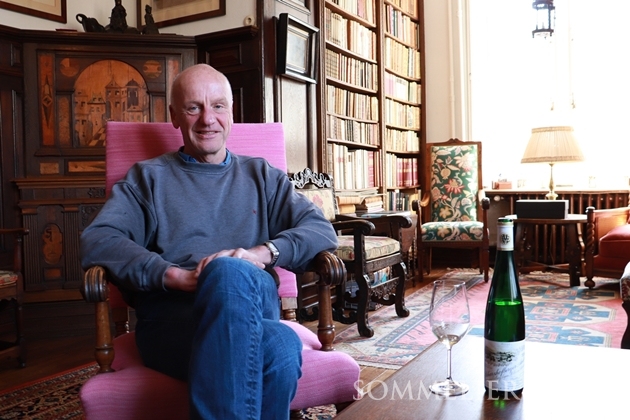
When I started to fall for Riesling, I also looked for the No.1 Riesling wine. As I thought, the most expensive wine was in Germany, the birthplace of Riesling. And of those, Egon Müller‘s Scharzhofberger Riesling Trockenbeerenauslese beat all other wines, being sold at over $13,000. Even when globally considered, this is one of the considerably highest priced ones. When I was shaking after seeing the price, I suddenly became curious. What kind of person would make such an expensive wine? What thought and what kind of lives would the people of this winery possess?
Such momentary curiosity sunk below after some time, but the curiosity came back when I was given the opportunity to go on a business trip to Germany. My desire to meet Mr. Müller became so strong, leading me to send an email to request an interview. The content of the email was about wanting to know about ’the person’ Egon Müller (the name of both winery and owner is Egon Müller)
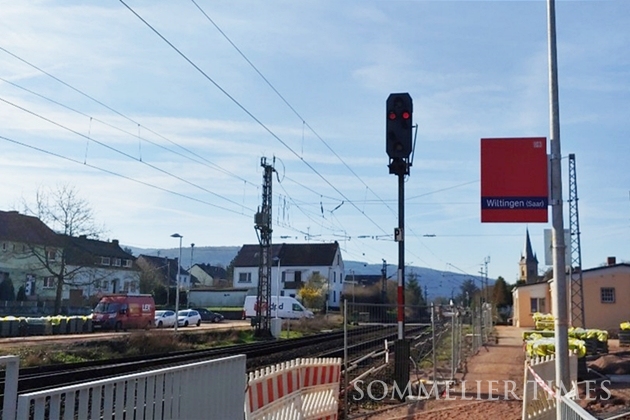
As if he had realized my earnest desire, I received a response from him that he would indeed conduct the interview. Thankfully, I got the chance to cover the world's best Riesling producer. I was so delighted but anxious on the other hand. 'Would I be able to do well?' My mood kept swinging from being nervous to excited until the morning when I met Mr. Müller.
In my imagination, Mr. Müller was unapproachable and that of being dignified. It was because of the weingut’s immaculate history and the title of being best. However, as soon as I saw him greeting me at the train station, it felt like I had met my uncle in the countryside. Egon Müller, who was relaxed and nice, reminded me of Mr. Selosse and Mr. Agrapart, whom I met during the last Champagne journey.
From who does the best Riesling arise from? This interview focused on the person Egon Müller.
Q: What was your dream when you were a child?
A: when I was a real child, I wanted to be grown up. I was always asking my mother or father how long does it take until I’m grown up.
Q: Haha, your dreams came true! Then, what are your hobbies?
A: I like cycling, drinking wine, and I like reading. I used to read books on history. but, now, not enough time. That’s probably only a drawback when you are a boss and responsible for a few people and families and days can be very long.
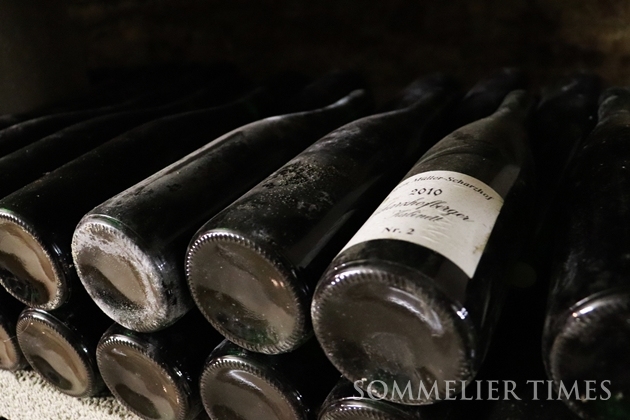
Q: Even though it’s a tough job to be a leader of both business and family, you seem to work very well. Which types of wines do you like?
A: If it’s good with food, I would like any wine. And I found out that as I’m getting older, I like more elegant wines rather than big and heavy wines.
Q: I guess my question needs to be more specific. Can you tell me which wines are stored in your cellar?
A: I have many wines from PFV. I’m a member of Premium Familiae Vini, which is an association of family wineries all around Europe, and one of the things we do is share wines. so we always have their stock. And probably what I have the most in recent years is from Burgundy.
Q: As you said, Egon Muller has been a family-owned winery. Have you ever had some generation gaps when working with your father?
A: After studying and traveling, I came back to join my father. He was to very happy to have somebody to help him and we never really had a generation gap. He said, “Now it’s your responsibility and I’m here to help you”. He had my backs and whenever the very difficult situations happened, he was always there to support. But he gave me responsibility very early. I would do the same thing to my son.
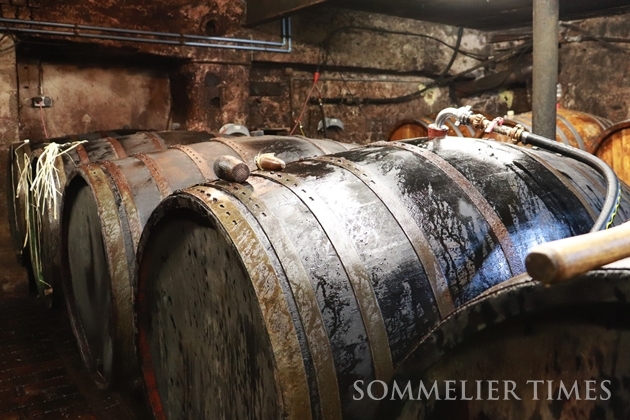
Q: Ever thought about changing something in the vineyard or winery?
A: In many wineries with long history, they all have their traditional vineyard and the tradition which have been developed over a long time. People have found what was the best given the soil, climate and general conditions in the area. So if you want to change something, you have to be careful because you might screw up whole thing that was originally in balance. If you have a complete package of traditionally owned area, the package has a certain balance already. Therefore, you must be very careful when playing with that.
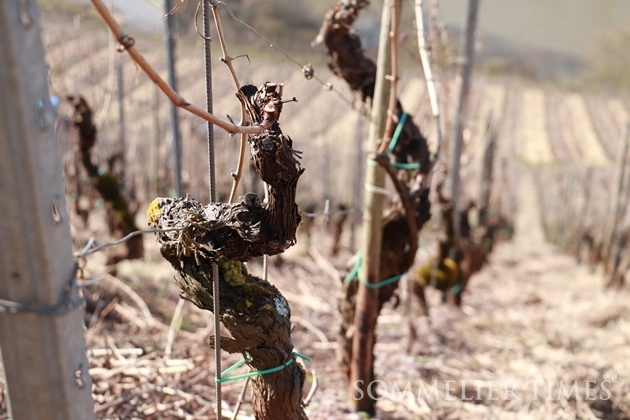
Q: I can get the point. You’ve got both one of the best vineyards and winemaking traditions. Particularly, Schartzhofberger is so a superb vineyard that even the German wine law tolerates omitting the village name on the bottle. Let’s get back to your story. When was the happiest moment in your life?
A: It’s hard to say, but it’s when I first had my son in my arm. Same feeling evoked with my daughter as well, but my son came first. He came three years early.
Q: Is your son’s name also Egon?
A: Yes, It’s a family tradition and also good for business.
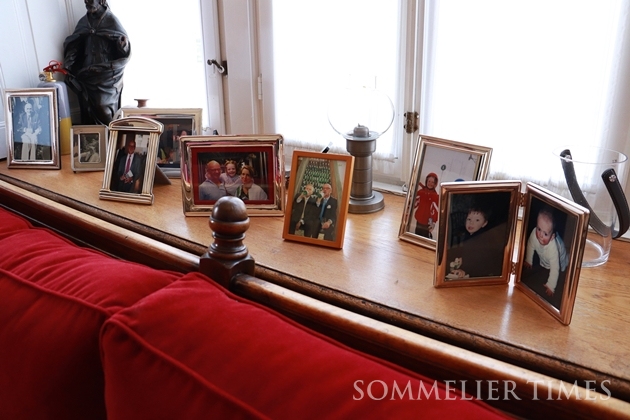
Q: Sounds a good strategy. Then, when was the hardest time?
A: It was when my father died. All of a sudden I realized that I was responsible for everything, and I had to grow up very quickly. I was 42 years old so I was late to grow up.
Q: What’s your philosophy when making wines?
A: Philosophy is a big word when it comes to wines. I was lucky to have a good vineyard, so the only thing I could do is to watch and make sure nothing goes wrong. That happens both in the vineyard and the cellar. So it’s not a philosophy. It’s good and proper work.
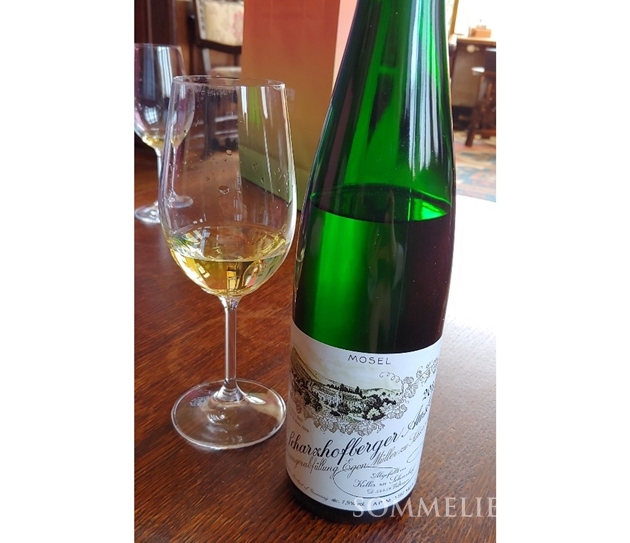
Q: The recent consumption trends have moved towards dry wines. You already make dry rieslings in Adelaide Hills, but do you have plans to make them in Mosel?
A: I can drink dry Riesling, no problem. My favorite dry riesling is Clos Sainte Hune. I’ve tasted many old vintages and I thought they showed how dry rieslings should taste. But I believe that here in the vineyard in Saar, we do not necessarily have the right balance in the grapes every year to make dry wines. I think our wines have the best balance with sweetness rather than the complete dryness.
In the last response of Mr. Müller, I could see his terroir-oriented mind, not dwelling on trends. People from great wineries always say the same thing- Terroir. It reminds me of a top student saying 'I received a sound grade by being loyal to the textbook'. It is nothing special, but I guess there is no truth clearer than this.
Mr. Müller's expression and way of talking showed what kind of person he is. Although he must have had jetlag after a long flight from Adelaide Hills to Mosel, he did the interview with great earnest without showing any tiredness for 4 hours.
While looking around the vineyard and cellar, he walked me through the process of winemaking. He explained the core values including why steepness of the vineyard and sustainable viticulture are important. It was more like a field trip by a vine grower and oenology rather than the brand introduction by a businessman. Sincerity towards the wines and people. I assured that’s how he could bring the vineyards and wines to the top condition.
Sommeliertimes Jiseon Kim j.kim@sommeliertimes.com

